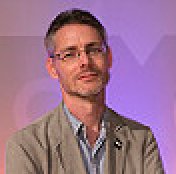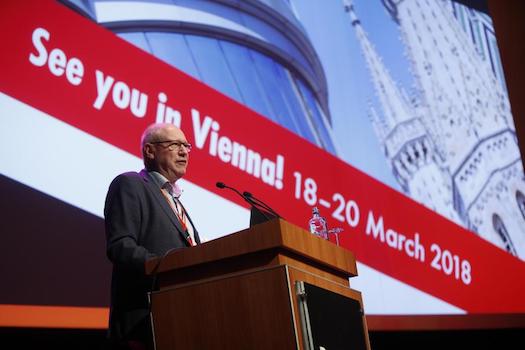Radio Tomorrow with James Cridland
In a few weeks, I’ll be at Radiodays Europe, the meeting-place for radio. It’ll be happening in Vienna in Austria, home of lots of beautiful old buildings and some quite forward-thinking radio stations, including the excellent Kronehit.
Last year, I saw a lot of interesting speakers. One of the things that I enjoy about Radiodays Europe is that you get to hear not just from English-speaking radio (which is relatively easy to research online), but also from radio stations from across Europe, too, and the world.
Sebastian Fitzek is a best-selling international author, writing films and books. But he also works for 104.6 RTL, a music station in Berlin, Germany. He talked at Radiodays Europe last March in Amsterdam about how a great radio presenter has a pair of glasses – virtual glasses through which they see the world. Any great presenter has their own viewpoint and experience, with which they can approach any subject: and when you hear them talk about something, it should be really clear what their experience is. One of the best interviewers on the BBC also owns a farm in Wales, and whenever he interviews a farmer or a food producer, that knowledge and understanding shines through. Often management shy away from wanting personal feelings as part of a news interview – but these “virtual glasses” are useful to learn more about the world. They’re an asset, not a liability.
I listened to Naja Nielsen from Danish Radio. She says that social media is very big – in Denmark, 73% of people aged under 30 get most of their news from social media: but many don’t realise that they also get it from radio, too. Her key message last year was that we need to make news programmes that people love and actively consume, rather than things that people don’t enjoy and just exist because we think we have to do them. They have a three hour news show on their youth station in Denmark which is one of the most popular shows on the station – hosted by young presenters with great thoughts and views on the issues of the day: and done in a way that appeals to people as entertainment.
When we think about the future of news, she said, we have to find new solutions to the needs people have. People want trustworthy news, they want to learn, they want facts but they might want this in a different way to how it has been done in the past.
Manoush Zomorodi from WNYC in New York spoke about something she called the Virtuous Cycle of Content. When you cover a story or a feature, ask your audience about it, ask them to help you with it. This leads to a better piece of radio with more voices from your audience, which leads to other people getting in touch, which leads to even better radio. She said that great radio starts with a conversation with your audience, and then you end up with a feedback loop of astonishingly great content – you change from having one or two people working on a show to having literally thousands. Meaningful interaction – rather than “what’s your favourite biscuit” – is great for the radio.
And Ulrik Haagerup also spoke. He’s the news director of Danish Radio, and he spoke at Radiodays Europe in Paris in 2016 about how news is often depressing and sad. He said many journalists focus on bad stories. He worries that news has turned into drama, conflict, and negativity. He asked if it is harder to get positive news. That doesn’t mean that the desire of saying something positive should get in the way of the facts, but it does mean, he said, that we should be open to idea of saying something positive. It means we should frame our questions in a way that lead to positive, constructive answers.
It strikes me that right now, great radio can benefit not just by focusing on the bad, but also mentioning the good in every story. There always is some, if you look hard enough.
I’m very much looking forward to being at Radiodays Europe this year. I’m talking about podcasting, and hosting a few sessions about the Norwegian switchover from FM to DAB. Drop me a line if you’re there too, and fancy catching up.
About The Author
James Cridland, the radio futurologist, is a conference speaker, writer and consultant. He runs the media information website media.info and helps organise the yearly Next Radio conference. He also publishes podnews.net, a daily briefing on podcasting and on-demand, and writes a weekly international radio trends newsletter, at james.crid.land.
Contact James at [email protected] or @jamescridland

